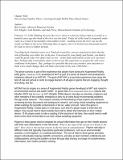Discovering Familiar Places
Author(s)
Coulter, Bob; Perry, Judy; Klopfer, Eric; Sheldon, Joshua
DownloadDiscovering Familiar Places-- Learning through Mobile Place-Based Games.pdf (983.4Kb)
OPEN_ACCESS_POLICY
Open Access Policy
Creative Commons Attribution-Noncommercial-Share Alike
Terms of use
Metadata
Show full item recordAbstract
February 12, 2100: Walking down by the river’s shore it is hard to believe that as recently as a hundred years ago this bank of the river was dry l and. Today all of this land is frequently under
water as a result of increasingly wild weather events. Looking across the river you see the steady red light on the tower indicating that yet again, rain is in the forecast and people need to be ready to move to higher ground. Traveling back a hundred years as a TimeLab researcher, you are surprised to learn that the risk of flooding was rather low in the past. Concerned for your family and friends, you think it would be great if the river didn’t have to rise – if this land could still be as dry as it was back then. Perhaps that is unrealistic and it is best to use this experience to prepare for still worse conditions in the future. But...perhaps it is possible that you can convince your ancestors to make a few small changes that will make your home in the year 2100 better.... The above scenario is part of the experience that players have during the Augmented Reality (AR) game, TimeLab 2100, developed at MIT as part of a series of research and development initiatives referred to as MITAR. The goal of MITAR is to provide experiences that merge the best of real and virtual in order to engage learners of all ages in games that are engaging, thought provoking, and fun.
Date issued
2012-08Department
Massachusetts Institute of Technology. Computer Science and Artificial Intelligence Laboratory; Massachusetts Institute of Technology. Department of Urban Studies and Planning; Massachusetts Institute of Technology. Institute for Data, Systems, and Society; Program in Media Arts and Sciences (Massachusetts Institute of Technology)Journal
Games, Learning, and Society
Publisher
Cambridge University Press
Citation
Coulter, Bob et al. “Discovering Familiar Places.” Games, Learning, and Society. Ed. Constance Steinkuehler, Kurt Squire, and Sasha Barab. Cambridge: Cambridge University Press, 2012. 327–354.
Version: Author's final manuscript
ISBN
9781139031127